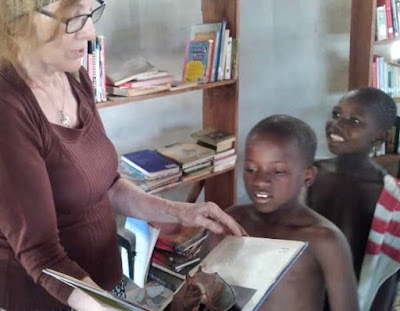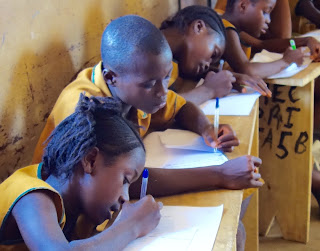What do you expect when we're sorting and dusting in the school library for hours on a Saturday? That we wouldn't open all those wonderful books to see what's inside? No way!
Wednesday, June 2, 2021
Friday, April 23, 2021
SELI Young Writers are writing again!
Here we are in the library at Dankawalie Secondary School in the northeastern Falaba District of Sierra Leone.
After a year's COVID-19 break, this school's SELI Young Writers club resumed this week, on the first day of the third term, with a full house. In addition, the library where the club meets today is much brighter thanks to Lasiray Energy and Communications which now offers solar power to subscribers throughout Dankawalie town.
Any of these students who attends this student-centered, workshop-like club regularly for 1-2 years will develop five personal experience essays through a number of revisions and editing, and in the process take such strides in their writing, reading, listening and speaking skills in English that their performance on their BECE public examination will be greatly improved.
Many thanks to the school's administration and to the club's facilitators, Mr. B.M. Kargbo and Mr. Kalie Kamara, as well as to the donors who make these clubs possible.
Wednesday, September 9, 2020
In the Time of COVID 2
This week, I sent this notice to the principals of schools where SELI maintains Young Writers clubs under the Seli River Writing Project:
I am sorry to say that because of the current COVID19 situation, SELI will be suspending Young Writers clubs for the 2020-2021 school year. I have hesitated to take this decision because every year it is the children who are at the highest risk of failing that our clubs embrace.
High-risk students benefit greatly from good content conferencing on their true personal experiences, which is best done around a table in groups of 4-6 with a teacher present. Everyone participates: children learn English from reading their work aloud, asking good questions, reflecting and explaining. People at the table talk quietly so the rest of the class can draft and revise.
Members also benefit from peer editing, where they sit closely with another member and discuss spelling, punctuation and verb tenses in both of their pieces. In teacher editing, they read their work aloud as they sit next to a teacher. The teacher listens to how the authors read to know whether they understand where sentences end, or whether someone is speaking, and then ask authors what kind of punctuation they need.
This proximity that is such a plus in our club meetings becomes a minus when social distancing is the rule. There are other reasons that we need to step away from club meetings during the COVID period. Moving about the room to access shared writing supplies or to go on to the next writing stage, helps club members take ownership over both their writing and their progress, but it, too, obstructs social distancing. Even the fact that we meet before or after school means that our students may not be protected by the same level of COVID precaution that is enforced by the school during its regular school hours. The health and safety of our children is paramount.
We fully expect to restart the SELI Young Writers program for the 2021-2022 school year in all interested schools. I urge you, in the meantime, to develop a teachers’ community of process-writing practitioners in your school using your Young Writers club teachers as advisors, so that this valuable method of teaching writing will gain its deserved place in your regular school classrooms.
In the Time of COVID 1
Twelve members of SELI's Young Writers clubs are about to receive "My Life" booklets like the ones pictured here from a previous year. To state that more clearly, before schools closed on March 31st, 2020, to protect students and staff from the pandemic, twelve club members had completed five final drafts, qualifying them for a printed booklet of their work.
Some of the recipients are from these schools in the Koinadugu and Falaba Districts: Dankawalie Secondary School, Dankawalie (4); Kabala Secondary School JSS, Kabala (1); and Movement of Faith Secondary School, Yiraia (3).
Other recipients are from these schools in the Western Rural Area: REC Primary, Bassa Town (1); Heaven Homes, Joe Town (2); and Seventh Day Adventist Primary School, Samuel Town (1).
We are delighted that Kalie A. Kamara, one of the club facilitators from Dankawaliehas been writing as well, and will also be receiving a booklet. Let's have more facilitators writing!
Saturday, January 25, 2020
What Primary School "Young Writers" Write About
Saturday, January 18, 2020
SELI's Charity GoFundMe Campaign
and receiving donations. Many thanks to donors who have responded so quickly to help keep us going through this year and the next!
Your contributions, however large or small, are what keep SELI able to support the Young Writers club facilitators with mentoring, refresher courses and training. If you would like to help further, please take a moment to share the link to others who can help.
Wednesday, November 6, 2019
"My Life" Books for 2019
The experiences are published as chapters in the books. The authors also had their photos taken and wrote dedications and "about the author" paragraphs to include. Here are the four members who earned "My Life" books in Heaven Homes Christian Academy in Joe Town, near Waterloo, posing with their teachers, Mr. A.P. Kamara and Mr. A. Kallon, and other members of the club who are on the way to finishing their books this academic year.
The two members who earned books in R.E.C. Primary School, Bassa Town (near Waterloo) gather with club members and one of their teachers, Ms. M. Kposowa, and their headteacher, Mrs. Yearie Kamara.
At Kabala Secondary School Junior, "My Life" booklets were presented at assembly by the principal, Mr. James S. Conteh.
Friday, September 13, 2019
Read All About It!
You'll learn all about what students in SELI's Young Writers clubs have written in their twice-weekly writing workshops. The members of our nine writing clubs all have copies, and are reading them, too. This girl is in REC Primary School, Bassa Town (near Waterloo).
Our children are learning to express themselves in English, which is not easy for them. Your comments, or feedback, are welcome.
Wednesday, July 24, 2019
Democracy in Schools
Tuesday, June 11, 2019
Graduation Day
TISLL's evaluator, Rev. Frederick Jones, was present along with the class teachers, Alusine H. Kamara and Balla Musa Kargbo. The SELI director was also there because SELI initiated the teacher training, has supported the class with materials, and brought the evaluator to the village. This was a big day for all of us.
SELI has initiated and supported this program because languages without a firm literary population tend to die out as cultural change takes place, and people ought to, by right, be given the opportunity to learn to read and write their own languages. The program is going on (another dozen or so adult learners are now working at level 1), but it needs to be funded. If you have an interest in the continuation of the Kuranko literacy class at Dankawalie, please consider making a donation to SELI for that purpose. We need your help! Please contact me at jackie@seli.co .














